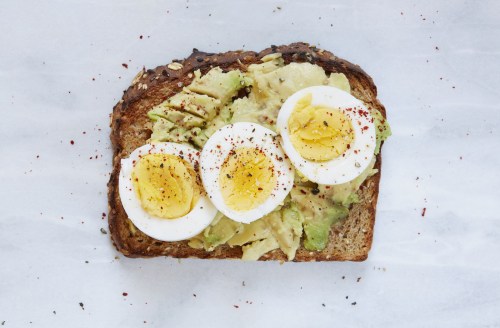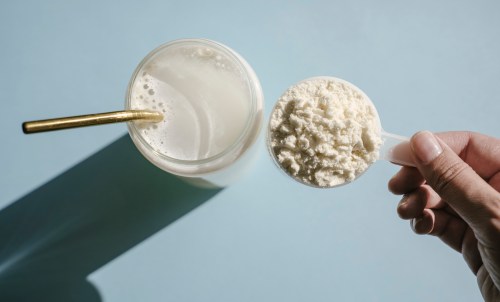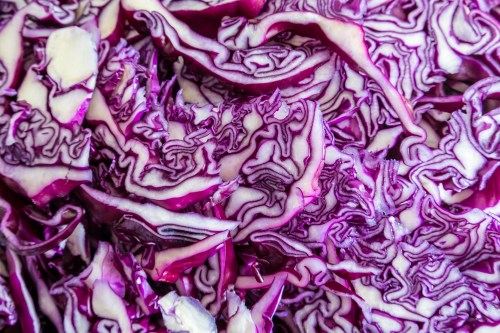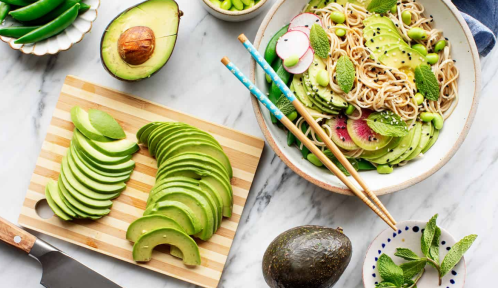Our editors independently select these products. Making a purchase through our links may earn Well+Good a commission
It’s a universally agreed-upon truism that breakfast is the most important meal of the day (and there are some studies to back this up). But while most of us are pretty good about making sure our breakfast is high in filling protein and healthy fats, there’s one nutrient most of us are overlooking in our rush to get out the door: fiber. And by not eating a high-fiber breakfast, we’re seriously missing out.
Experts in This Article
registered dietitian and owner of BZ Nutrition
lead registered dietitian for GutPersonal
board-certified sports dietitian
registered dietitian and founder of Nutrition Starring You
Pittsburgh-based registered dietitian
nutrition expert and author of The Healthy Meal Prep Cookbook
When you’re eating your breakfast for digestive health—aka ensuring you’re always consuming fiber-rich morning meals—you’re boosting gut health and even putting an end to your constipation woes. (Endless thank-yous, gut-friendly foods!) Ahead, learn how much fiber you should be eating every day as part of a gut health diet, the close relationship between fiber and digestion, and dietitian-approved breakfasts for promoting gut wellness.
The benefits of eating a high-fiber breakfast
Even if you think you’re eating enough fiber every day, chances are you could still up your fiber-rich morning meals. “Nine out of 10 Americans do not reach fiber goals with an average intake at 12-14 grams out of the 25-38 grams recommended by the U.S. dietary guidelines,” says Lauren Harris-Pincus, RDN, author of The Protein-Packed Breakfast Club. And fiber has a lot of health benefits to offer, especially when consumed first thing in the morning.
According to Madeleine Putzi, MS, RDN, a Pittsburgh-based registered dietitian, eating balanced morning meals that contain plenty of fiber lays a solid foundation for your day. “Fiber helps you feel fuller for longer. This will help you maintain your energy levels through lunchtime, when people often hit that midday slump,” she says. That’s not all: “Fiber is also an essential part of healthy eating in general, as it reduces heart disease, regulates blood sugar, and helps to prevent GI cancers,” says Brigitte Zeitlin, RD, owner of BZ Nutrition in New York City.
While it’s clear fiber is an all-star in many ways, it should also be a prime part of any gut health diet. According to Jillian Smith, RDN, lead registered dietitian for GutPersonal, dietary fiber and gut health are closely intertwined, as fiber “promotes regular bowel movements, feeds beneficial gut bacteria, and helps prevent digestive issues.” One such issue is, umm, any blockages you may experience, as fiber and digestion go hand-in-hand and eating a high-fiber breakfast for constipation can help keep things moving. “Fiber helps to normalize your bowel movements, preventing constipation and bloating, while also keeping you full for long periods of time,” says Zeitlin.
But how does fiber play such a significant role in a gut health diet? According to Putzi, fiber acts as a prebiotic, which feeds the “good” bacteria in your gut. “This, in turn, helps increase and promote a healthy, diverse microbiota,” she says. “If you experience indigestion when eating high-fiber foods, this is likely due to a lack of fiber in your diet overall. Though it seems counteractive, slowly increasing your fiber intake over time will help your body increase its tolerance and adjust.”
While eating enough fiber is important for everyone (hello, endless benefits!), a high-fiber breakfast for diabetics is especially crucial: “Fiber helps to lower cholesterol levels, but also assists in blood sugar regulation, which is particularly important for diabetics or those at risk of developing diabetes,” says Putzi.
What breakfast foods are high in fiber? 7 dietitian-approved breakfasts to start with
Breakfast is an excellent time of day to pack in extra fiber, which not only makes your gut happy but also keeps you satisfied and less likely to reach for the office donut tray or candy bowl mid-morning, Harris-Pincus says. The same goes for protein and healthy fats, so pair them with fibrous foods when preparing any breakfast for digestive health.
If you’re working on boosting gut health and promoting gut wellness overall, these dietitian-approved breakfasts—from parfaits to avocado toast—will start your day off strong.
1. Breakfast parfait
“One of my favorites is super simple: Add a half cup of cottage cheese and top with a half cup of a high-fiber breakfast cereal like Fiber One or All Bran, and one cup raspberries or blackberries,” says Harris-Pincus. (If you don’t like cottage cheese, go with plain Greek yogurt instead—a super high-protein breakfast food.) Berries are the highest in fiber among fruits, with eight grams per cup, and the cereal contains about 14 grams per half cup. That’s a total of 22 grams, which almost meets the daily goal for women in one single meal.
2. Avocado toast
When it comes to gut health, avocado toast is anything but basic. “This is a great savory breakfast option that’s high in fiber and antioxidants,” says Zeitlin. The combo of avocado and whole grain bread is also an easy high-fiber breakfast for diabetics. Simply toast a slice of your favorite whole grain bread and top it with half of an avocado (either mashed or in slices), she says—you’ll get seven grams of fiber from the avocado plus a few more from the bread. Then sprinkle on a few tablespoons of chia seeds, flax seeds, or hemp hearts to add some extra protein.
3. Apples and almond butter
For a sweeter breakfast option that also aids in promoting gut wellness, go fruity for that fiber. Apples and almond butter are the dietary fiber and gut health dream team. “Your favorite type of apple with two tablespoons of almond butter will give you just about eight grams of fiber for the meal to fight any constipation or bloat you may be feeling,” says Zeitlin. You can add some extra protein by sprinkling on chopped walnuts, pistachios, or slivered almonds.
4. Breakfast sandwich
Kelly Jones, RD, CSSD, LDN, loves a breakfast sandwich for an easy dose of fiber first thing in the morning. “Pick a [whole grain] English muffin with five grams of fiber per serving and pair with protein-rich hard-boiled eggs,” she says. Serve with a cup of blueberries on the side for an additional four grams of fiber. (She suggests slicing up the hard-boiled eggs and putting them inside the English muffin, then serving the blueberries on the side.) “By pairing with blueberries, you’re starting your day off with nutrient-rich produce, too,” she says.
5. Overnight oats
Rolled oats are an excellent source of fiber. “In addition, the soluble fiber found in oats has been shown to help reduce your cholesterol levels,” says Toby Amidor, RD, award-winning nutrition expert and author of The Healthy Meal Prep Cookbook. Oatmeal is also a great high-fiber breakfast for diabetics, as it’s been shown to help manage blood sugar levels. Amidor likes overnight oats in particular because “[they’re] an easy way to get off the hot oatmeal bandwagon, plus you can prep everything the night before so you have nothing to do in the morning except eat it.” But if you prefer something warm and cozy, you can whip up a baked oatmeal breakfast instead.
6. Veggie-packed smoothie
While there are plenty of healthy breakfast ideas to choose from, opting for a high-fiber drink is perfect for any morning you’re in a rush. Fruit naturally has fiber, but you can up the ante by adding some veggies to your morning smoothie. “Not only will you get a healthy boost of antioxidants, but it will also boost up the fiber,” says Amidor. “For example, add a handful of spinach or kale to a berry smoothie. Want even more fiber in your morning bevie? Add a spoonful of peanut butter, flax or chia seeds, or a piece of avocado,” she recommends. Cauliflower also makes for a surprisingly creamy smoothie.
7. Breakfast wrap
Find yourself with a little bit more time in the a.m.? Mix up your breakfast game with a high-fiber take on a breakfast burrito. “Enjoy your morning scrambled eggs mixed with black beans and vegetables like red peppers and onions [and] rolled into a whole wheat wrap. The beans, veggies, and whole grain wrap will provide a healthy dose of fiber,” says Amidor. This way, you’re getting a balance of fiber, protein, grains, and healthy fats to really power your brain. You can even add some avocado for creaminess, if you like.
How can I increase my fiber intake for breakfast?
You now have plenty of ideas for fiber-rich morning meals. But if you’re looking for quick tips that will come in handy when prepping a breakfast for digestive health, dietitians are here to help. These simple changes make dietary fiber and gut health a priority.
1. Incorporate whole grains
Want to start eating nutrient-dense breakfasts? Make sure you always have some whole grains on hand. “Incorporate whole grains, like oats or quinoa, into breakfast dishes, as these provide a substantial dose of fiber to kickstart your day with digestive benefits,” says Smith. While she says that could be anything from oatmeal to whole grain pancakes, another one of the best breakfast choices for digestion is simply avocado toast with a slice of whole grain bread.
“I recommend 100% whole grain bread with nuts and seeds,” says Putzi. “Unlike white bread, whole grain bread is made using the bran, germ, and endosperm, which contain the most fiber. The addition of seeds will give you an abundance of vitamins and minerals, healthy fats, and protein, with a low glycemic index, which is optimal for blood sugar regulation.”
2. Add fresh fruit
Sneaking fruit into your meals is a cinch. With all the different high-fiber options to choose from, the healthy breakfast ideas are endless. “Berries in particular are high in fiber. Just one cup of blackberries or raspberries contains eight grams of fiber, which is almost a third of the daily recommended intake for women,” says Putzi. Smith recommends blending berries into your morning smoothies alongside bananas and spinach, “which not only enhance the flavor but also add fiber and essential nutrients to your breakfast in a convenient way.” Or eat berries alongside your favorite high-fiber breakfast cereal. Boosting gut health has never been easier.
3. Leave the peel on
If you tend to peel your fruit before eating it, Putzi says to drop that habit ASAP. If you’re aiming for balanced morning meals, leaving the peel intact will give you the most nutrient-dense breakfasts. “Without the skin, your apple will only provide two grams of fiber. However, if you keep the skin, you’re more than doubling your fiber intake at 4.4 grams,” she says. The peel should also be part of any high-fiber breakfast for constipation. “Seventy-seven percent of the apple peel contains insoluble fiber, which is what aids constipation,” she adds.
4. Add some flaxseed
Flaxseed is one of the most gut-friendly foods thanks to its high content of soluble fiber. Experts say that’s what makes it a must-have in any high-fiber breakfast for constipation (or if you’re looking for healthy breakfast choices for digestion in general). “One tip I suggest for adding more fiber into your diet is adding one to two tablespoons of ground flaxseed to your breakfast,” says Putzi. “Flax can be added to really anything: yogurt, toast, smoothies, cereal, and more.”
Frequently asked questions about high-fiber breakfasts
What breakfast is best for constipation?
Focusing on fiber and digestion does your body good. If you’re looking for the best breakfast choices for digestion—particularly when it comes to constipation—registered dietitians have you covered with two gut-friendly foods to start with. “For constipation relief, it’s best to optimize your intake of insoluble fiber. Insoluble fiber is non-digestible, so it works through your digestive system quickly by bulking up the stool,” says Putzi. Her go-tos? Whole grain oatmeal, bran cereal, apples with the peel, and berries, all of which “are high in this type of fiber and best for relieving constipation.”
If you’ve heard prunes are great for constipation too, the rumors are true. “Prunes are an excellent breakfast choice for alleviating constipation because they’re high in fiber and naturally help soften stools and promote regular bowel movements,” says Smith. According to a 2014 systematic review published in Alimentary Pharmacology & Therapeutics, prunes were found to improve stool frequency and consistency. And in a small 2011 study, their effectiveness in relieving constipation was so impressive that the study authors wrote they should be “considered as a first-line therapy for chronic constipation.”
What breakfast food has more fiber than oatmeal?
There are so many options for balanced morning meals, but when it comes to the most fiber-packed and nutrient-dense breakfasts, oatmeal seems to always be at the top of the list. But it may surprise you to learn there are other healthy breakfast ideas that pack more of a punch when it comes to fiber, starting with bran cereal. While oatmeal has four grams of fiber per serving, bran cereal comes in at 12 (or more!) grams of fiber per serving, depending on the brand of high-fiber breakfast cereal you purchase.
“Bran cereal typically has more fiber than oatmeal, making it a good choice for those looking to increase their fiber intake,” says Smith. “It provides a concentrated source of insoluble fiber that promotes digestive regularity and helps maintain satiety.”
What is the best form of fiber to take?
When choosing the best form of fiber to take, Smith recommends a combination of both soluble and insoluble fiber from a variety of whole foods. “This provides a broad range of health benefits, including better digestion, improved heart health, and stabilized blood sugar levels, while also supporting overall nutrient intake and gut health,” she says.
According to Putzi, each form of fiber is beneficial for different reasons. “Soluble fiber dissolves in water and slows digestion, which helps lower cholesterol and regulate blood sugars. Insoluble fiber helps move the digestive tract, which promotes bowel health,” she says. “Most fiber-rich foods contain a mixture of both kinds of fiber, which will provide the biggest benefit.”
Sign Up for Our Daily Newsletter
Get all the latest in wellness, trends, food, fitness, beauty, and more delivered right to your inbox.
Got it, you've been added to our email list.











